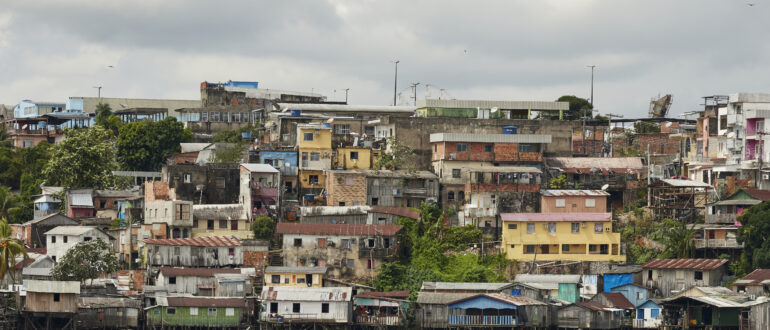01 de Diciembre de 2023 – Hábitat para la Humanidad hace un llamado a los delegados de la conferencia sobre cambio climático, COP28, para que prioricen las necesidades de vivienda de las poblaciones vulnerables, en particular de aquellos que viven en asentamientos informales, mediante la adopción de medidas que aborden de manera significativa el impacto del cambio climático en la vivienda segura, digna y asequible.
«Hoy, nos enfrentamos a una crisis mundial de la vivienda que se ve agravada por los fenómenos meteorológicos cada vez más extremos y el calentamiento global«, afirma Jonathan Reckford, CEO de Hábitat para la Humanidad Internacional. «Sabemos que quienes viven en asentamientos informales contribuyen en menor medida a las emisiones de carbono, pero a menudo son los más afectados por el cambio climático. También, sabemos que una forma de mejorar la educación, la salud y el empleo de quienes viven en asentamientos informales es invertir en viviendas seguras y adecuadas. Debemos garantizar que los esfuerzos de adaptación sean asequibles y accesibles para que todas las personas puedan prosperar en hogares seguros y decentes«.
La 28ª reunión de la COP28 es la última de una serie de conferencias de las Naciones Unidas sobre el cambio climático. La reunión de este año incluirá el primer balance mundial del Acuerdo de París sobre el Cambio Climático, jurídicamente vinculante. De importancia crítica entender que la implementación de acciones de adaptación que priorizan a las comunidades vulnerables, que se detallan en el Acuerdo de París, actualmente representa menos del 1% en todo el mundo. Hábitat para la Humanidad, participante oficial en la COP28, publicó una lista de prioridades y recomendaciones políticas (disponible sólo en inglés), que insta a los líderes reunidos en la conferencia a reconocer los beneficios económicos y sociales de integrar prácticas de vivienda sostenible y resiliente en sus planes nacionales de adaptación, especialmente para quienes viven en asentamientos informales y en zonas de rápida urbanización.
Es urgente fomentar la adaptación progresiva de las viviendas de los asentamientos informales, utilizando materiales de construcción con bajas emisiones de carbono y garantizando que los códigos de edificación fomenten prácticas de construcción sostenibles, incluido el diseño pasivo y soluciones basadas en la naturaleza que eviten el consumo excesivo de recursos naturales. Estas y otras soluciones se destacan en un nuevo informe llamado: Adaptación climática a través de la vivienda: ejemplos de intervenciones efectivas en asentamientos informales (disponible sólo en inglés).
Otro nuevo informe elaborado por el Centro Terwilliger de Innovación en Vivienda de Hábitat para la Humanidad llamado Oportunidad emergente: el papel oculto de la tecnología en vivienda en la inversión en tecnología climática — analiza hasta qué punto el sector de la tecnología en vivienda ha sido cortejado por la tecnología climática
y los inversores de impacto; y examina las posibles vías para superar las barreras a la inversión y lo que se puede hacer para atraer a más inversores de tecnología climática en esta área.
El sector de la tecnología en vivienda se centra en productos y servicios innovadores y escalables para los mercados de vivienda de bajos ingresos que tienen el potencial de tener un impacto climático.
Dec. 01, 2023 – Habitat for Humanity International is calling on delegates at the COP28 climate change conference to prioritize the housing needs of vulnerable populations, particularly those who are living in slums and informal settlements, by taking action that will meaningfully address the impact of climate change on safe, decent and affordable housing.
“Today we are faced with a global housing crisis that is made worse by increasingly extreme weather events and global warming,” said Jonathan Reckford, chief executive officer of Habitat for Humanity International. “We know that those living in informal settlements contribute the least amount of carbon emissions but are often the most affected by climate change. We also know one way to improve education, health and employment outcomes for those living in informal settlements is to invest in safe and adequate housing. We must ensure that adaptation efforts are affordable and accessible so that all people can thrive in safe and decent homes.”
The 28th Conference of the Parties meeting, or COP28, is the latest in a series of United Nations climate change conferences. This year’s meeting will include the first global stocktake of the legally binding Paris Agreement on Climate Change. Of critical importance, the implementation of adaptation actions that prioritize vulnerable communities, which are detailed in the Paris Agreement, currently stands at less than 1% around the globe.
Habitat for Humanity, an official participant at COP28, released a list of policy priorities and recommendations that urges leaders gathering at the conference to recognize the economic and social benefits of integrating sustainable and resilient housing practices into their national adaptation plans, especially for those living in informal settlements and in areas of rapid urbanization.
There is urgent need to encourage the incremental adaptation of housing in informal settlements, using low-carbon materials in construction and ensuring that building codes encourage sustainable building practices including passive design and nature-based solutions that prevent overconsumption of natural resources. These solutions and others are highlighted in a new report: Climate Adaptation Through Housing: Examples of Effective Interventions in Informal Settlements.
Another new report developed by Habitat for Humanity’s Terwilliger Center for Innovation in Shelter — Emerging Opportunity: The Hidden Role of Sheltertech in Climate Tech Investing — analyzes the extent to which the sheltertech sector has been courted by climate tech and impact investors and examines potential avenues for overcoming investment barriers in the sheltertech space, and what can be done to attract more climate tech investors into this area. The sheltertech industry focuses on innovative and scalable products and services for low-income housing markets that have the potential to make climate impact.

